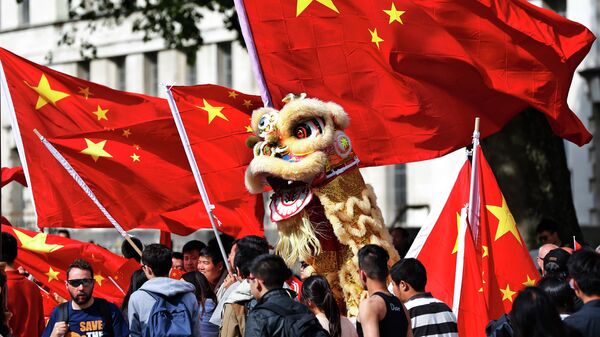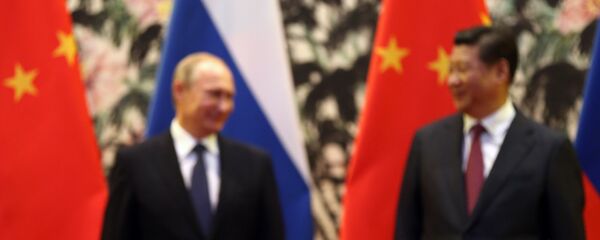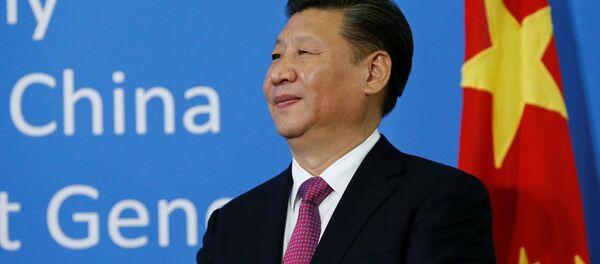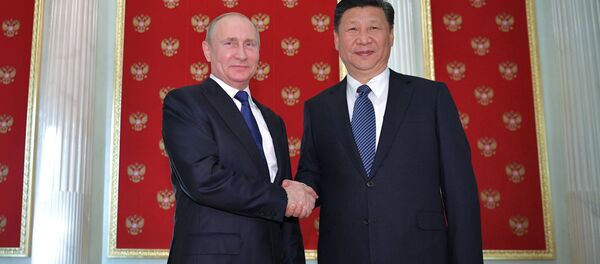The Trump administration is determined to exert considerable pressure on Beijing to force it to adopt a tougher stance toward North Korea.
"Since the beginning of the summer, Washington has been conducting targeted attacks on Beijing's interests, criticizing it for its inability or unwillingness to bring the North Korean missile program to a halt. Washington's pressure on Beijing has intensified in recent weeks," political observer Igor Gashkov wrote for RIA Novosti.
The journalist noted that the Trump administration is considering the possibility of increasing trade tariffs on cheap steel supplied to the US by China. Earlier, the US Treasury imposed sanctions on the China-based Bank of Dadong, blaming it for money laundering to help North Korea.
Needless to say, Pyongyang's recent missile test has added fuel to the fire.
"North Korea has just launched another missile. Does this guy have anything better to do with his life? Hard to believe that South Korea…. and Japan will put up with this much longer. Perhaps China will put a heavy move on North Korea and end this nonsense once and for all!" US President Donald Trump tweeted July 4.
North Korea has just launched another missile. Does this guy have anything better to do with his life? Hard to believe that South Korea…..
— Donald J. Trump (@realDonaldTrump) 4 июля 2017 г.
….and Japan will put up with this much longer. Perhaps China will put a heavy move on North Korea and end this nonsense once and for all!
— Donald J. Trump (@realDonaldTrump) 4 июля 2017 г.
On July 5, the US President ranted about Beijing developing trade relations with Pyongyang.
Trade between China and North Korea grew almost 40% in the first quarter. So much for China working with us — but we had to give it a try!
— Donald J. Trump (@realDonaldTrump) 5 июля 2017 г.
"Trade between China and North Korea grew almost 40% in the first quarter. So much for China working with us — but we had to give it a try!" he tweeted.
Thus, in late June the White House approved the sale of more than $1 billion in arms to Taipei.
Furthermore, on July 2 the USS Stethem entered waters claimed by Beijing in the South China Sea and sailed near Triton Island, part of the Paracel Islands archipelago, claimed by China.
Predictably, the moves have prompted fierce criticism from the Chinese leadership.
"And all these actions — sanctions against Chinese companies, especially arms sales to Taiwan — will certainly undermine the mutual confidence of the two sides and runs counter to the spirit of the Mar-a-Lago summit [between Doland Trump and Xi Jinping in April 2017]," China's Ambassador to the US Cui Tiankai said, commenting on the matter.
"The complicated story of bilateral relations [between the US and China] will have to continue on July 6-7 at the G20 summit in Hamburg. Expectations are not too optimistic. Anti-Chinese measures, taken almost simultaneously, look as if they are confined to a meeting of leaders," Gashkov emphasized.
The journalist quoted Petr Mozias, an economist from the National Research University's Higher School of Economics, who noted that the Trump administration has chosen the wrong path.
"The media reported that President Trump had allegedly demanded unofficially all-out sanctions against North Korea from Beijing; I do not know whether that's true, but if it's true, [Trump] has made a mistake," Mozias told RIA Novosti.
"It's inappropriate to speak rudely with the Chinese: they will neither forget nor forgive this. They will not do anything under pressure, especially if it's imposed by Western countries. In their culture, this behavior is called a 'loss of face,' there is nothing worse than this," the academic highlighted.
Mozias stressed that Beijing is not interested in the crisis on the Korean Peninsula.
"Comprehensive sanctions against North Korea may destabilize its regime, leading to its collapse. However, China is not interested in the destabilization of the Korean peninsula. Historically, the Chinese and Koreans fought side-by-side: in the Middle Ages against the Japanese, and in the 20th century — against the Americans. These stories are told in Chinese schools, and any Chinese leader who would want to bring down the DPRK would have to face a negative reaction within his own country," Mozias elaborated.




